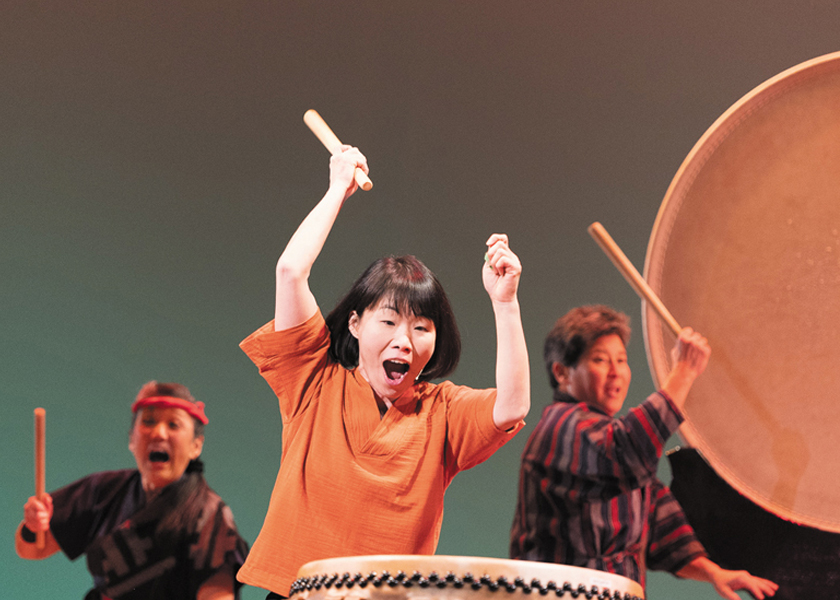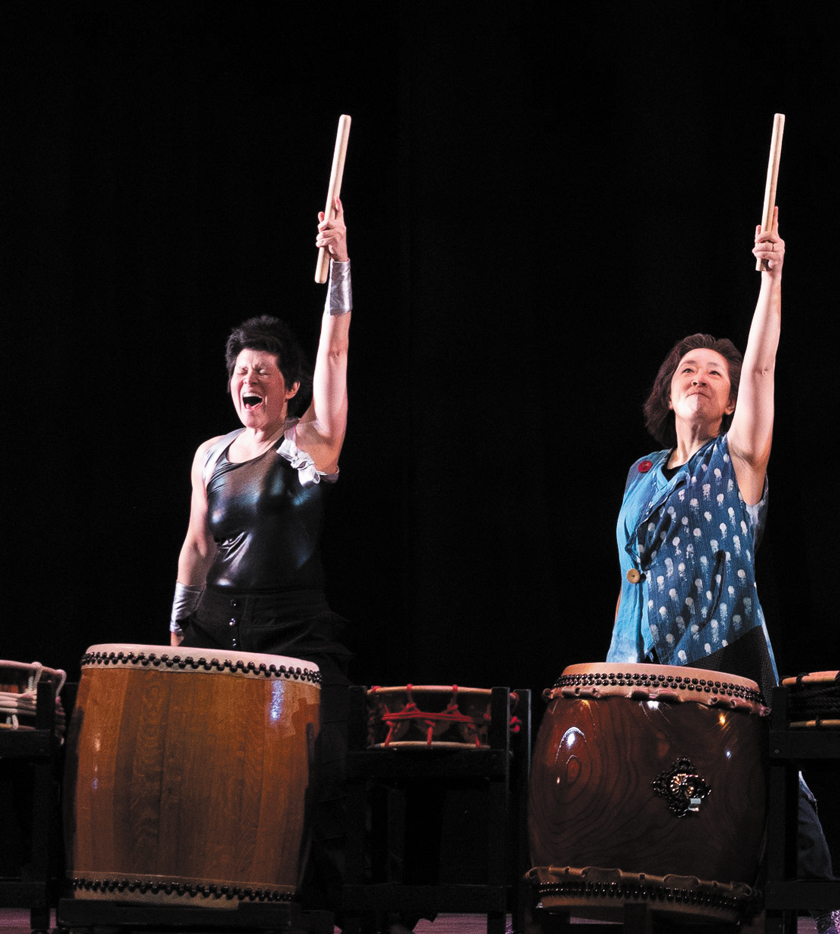HerBeat showcases the talent and skill of an all-female taiko team | Review by Tiffany Pauling (Spring 2020 issue)

From the first hit, the performers in HerBeat: Taiko Women All-Stars made it clear that physical strength isn’t required to be a great taiko player. Presented by TaikoArts Midwest, HerBeat was a first of its kind all woman taiko performance. The best professional women taiko players were flown into St. Paul from Japan and North America at the end of February and came together for a two-week-long workshop culminating in a sold-out performance February 29 at the Ordway in St. Paul.
Taiko, with its barrel-shaped drums and elegant performing style, is traditionally a male artform. Despite women now making up more than half of all taiko groups, men still are the face of taiko and the apparent owners of its history. The strict tradition that is part of this Japanese percussion form often discourages young women from playing or pursuing anything but supportive roles.
HerBeat pushed against this idea and put women in charge and at center stage. This was their chance to tell their stories and show their prowess on the drums.
In addition to the workshop and concert, the event was filmed by award-winning documentary filmmakers Dawn Mikkelson and Kerri Pickett, with a mostly-female team. The product will be a full-length documentary to continue to tell the women performers’ stories, show their lives behind the scenes, and share this project with a world-wide audience.
In usual taiko tradition, the performers encouraged the audience to participate throughout the concert. At the beginning of the show the audience was encouraged to “express their spirit” throughout the concert. And the audience was more than happy to cheer the drummers on. There were no songs where the audience was completely silent. The performers more than deserved the expressions of spirit.

Kokorozashi was one of the most dynamic songs, written by Tiffany Tamaribuchi, the woman behind the show. In her introduction, she said that the song requires will and determination. Throughout the piece each artist plays very short bursts of improvised solos. The solos began simply and eventually culminated in one woman pushing the others away as she hit each drum on the stage. The energy of the theater peaked at this moment as everyone cheered on each soloist, pushing them to a high energy level.
Two of the songs played to the Minnesotan audience: Ode to Mississippi River and Mochizuki. Like a classic ode, Ode to Mississippi River was structured in three parts showcasing three different seasons of the Mississippi River. For the fall season, one performer played a large standing drum, the odaiko, as another used a large rainstick. The effect was the sounds of a rainstorm on a dark night. The spring segment featured a dancer making butterflies with fans, to the sound of a flute and an upbeat tempo. The song was a gorgeous mix of the traditional with the modern, much like what the Mississippi River represents today.
Mochizuki featured a large ensemble of performers. It was energetic with many of the players performing jumps and twirling their drumsticks in complex patterns, while creating a rhythm filled with energy and playfulness. The players also chanted; most in the audience did not understand the Japanese, but one line was in English “We are in Minn-e-so-ta-de-su.” The chant brought laughter and one of the loudest cheers of the night.
I truly felt lucky to have seen this concert, a penultimate production by a unique group of musicians after only two weeks of intense training preceded by a year’s worth of planning. The time of the concert marked a ramp-up of media attention paid to the first cases of COVID-19 in the U.S. If the concert were to have happened even two weeks later, it most likely would have been cancelled. Indeed, only three days after the concert, I decided to cancel my own upcoming plans.
At its heart, this production was exactly what was needed: An international, all-women collaboration showing that taiko is a complex art form, which is more than its reputation for power and noise-making, and too beautiful not to be led and enjoyed by women as well as men. From start to finish, this project represented a community effort, and we all need community, now more than ever before.
Mikkelson’s documentary, which will bring this concert to a bigger audience, is slated to open next year.
More information, a trailer and a donation link for the documentary HerBeat is located at the website of TaikoArts Midwest, whose artistic director Jennifer Weir (a Korean adoptee) created the concept and raised the funding for the concert.
Korean Quarterly is dedicated to producing quality non-profit independent journalism rooted in the Korean American community. Please support us by subscribing, donating, or making a purchase through our store.


